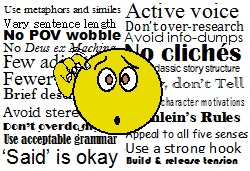Looking back over my 200 blog posts, I see I’ve presented a lot of rules about writing. The question might be occurring to you beginning writers—how am I supposed to remember all that? And you’re thinking, if I have to keep all those rules in mind, it all seems too hard. I’ll never be a writer.
 Yes, you can be a writer, most likely. If there’s a story in you that you feel passionate about, then your knowledge of all my previous ‘rules’ is secondary. Conversely, even if you’ve memorized all the rules I’ve presented, there’s little hope for you if you aren’t driven to write by something powerful inside.
Yes, you can be a writer, most likely. If there’s a story in you that you feel passionate about, then your knowledge of all my previous ‘rules’ is secondary. Conversely, even if you’ve memorized all the rules I’ve presented, there’s little hope for you if you aren’t driven to write by something powerful inside.
I recommend, therefore, that you use that powerful drive, sustain your strong passion for the idea, and write the first draft without regard to any rule. Forget all I’ve said about using active sentence structure, showing and not telling, not overdoing dialect, etc.
Then, in your second and subsequent drafts you can edit to make sure you’re following the ‘rules.’ Write them down if you have trouble remembering them. That list of rules can be your ‘editing list’ which will help you recall what you’re checking for as you edit.
If you find your critique group, or editors, or reviewers, pointing out a certain common defect in your stories, you can add that defect to the editing list and make a point of correcting that problem in subsequent stories.
Over time you may find a funny thing begin to happen. You’ll break fewer rules in your first drafts. You’ll be able to remember more of them as you write. Or maybe not remember them consciously, but somehow know them as you madly scribble that first draft.
It’s the same phenomenon that occurred when you learned to ride a bicycle, drive a car, or play a musical instrument. The task that seemed so complicated and daunting at first, that skill you thought you couldn’t master because there was so much to remember, somehow became easier. Things you once had to concentrate on became things you do without thinking.
Recently I heard an experienced author at a writer’s conference say she could no longer turn off her inner editor while writing a first draft. She does subsequent drafts, but there are fewer things to correct than there were with her first books. If that ends up happening to you, perhaps the final step will be to give up subsequent drafts entirely, and let the first draft be the final one. Isaac Asimov claimed he didn’t edit or write second drafts. Perhaps you’ll achieve that level of skill.
Remember, you don’t have to keep all the rules in mind during the first draft. When writing that one, don’t think about rules at all; just write. Now, if I could only recall how I’m supposed to end these blog posts…so much to remember. Oh, yeah, I just sign it—
Poseidon’s Scribe
